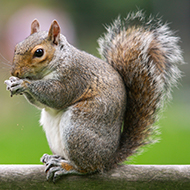
Tree-dwelling rodents evolved to have greater brain power than burrowing relatives.
A new study has suggested that squirrels and other tree-dwelling rodents have evolved to have bigger brains giving them key abilities such as better vision and motor skills, and improved head and eye movements.
Researchers from the University of Edinburgh used CT scans of skulls from 38 living and extinct rodent species to examine how the animals’ brains have changed over time. This data revealed that the overall size of rodents’ brains have been affected by their body mass, lifestyle and evolutionary history.
According to the study, squirrels' relative brain size has increased over time, mostly due to a sharp decrease in their body mass. Two key regions of the brain – including the neocortex, which is involved in vision and motor skills – became larger in species living in trees. The petrosal lobules – which help with stabilising eye movements as the head rotates and tracks moving objects – also increased in size.
This increase in brain power has helped tree-dwelling rodents adapt to life in complex environments, researchers say.
The previously mentioned regions of brain are comparatively smaller in mountain beavers – squirrels' closest living relatives. This is likely because these animals live in burrows, therefore spending most of their time underground with little light. As a result, the need good vision might be less crucial than it is for tree-dwelling animals.
Dr Ornella Bertrand, of the University of Edinburgh’s School of GeoSciences, said: “Squirrels' ancestors were at an important juncture 34 million years ago. They were smaller than their closest extinct relatives, and there were far fewer primates living in trees than today, which opened up a new niche for them. When trees became available to them, squirrels' ancestors seized the opportunity.
“This transition was a key evolutionary step for squirrels as it enabled them to acquire larger and more complex brains."



 The latest
The latest